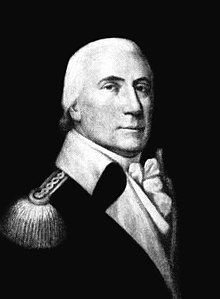Alexander Martin
| Alexander Martin | |
|---|---|
 |
|
| 4th & 7th Governor of North Carolina | |
|
In office April 22, 1782 – May 13, 1785 December 17, 1789 – December 14, 1792 |
|
| Preceded by |
Thomas Burke Samuel Johnston |
| Succeeded by |
Richard Caswell Richard Dobbs Spaight |
|
United States Senator from North Carolina |
|
|
In office March 4, 1793 – March 4, 1799 |
|
| Preceded by | Samuel Johnston |
| Succeeded by | Jesse Franklin |
| Member of the North Carolina Senate | |
| Personal details | |
| Born | 1740 Hunterdon County, New Jersey |
| Died | November 2, 1807 (aged 66–67) Rockingham County, North Carolina |
| Political party | Anti-Administration Party |
| Military service | |
| Allegiance |
|
| Service/branch | North Carolina state militia |
| Years of service | 1775–1777 |
| Rank | Colonel |
| Battles/wars | |
Alexander Martin (1740 – November 2, 1807) was the fourth and seventh Governor of the U.S. state of North Carolina from 1782 to 1784 and from 1789 to 1792.
Born in New Jersey in 1740, to James Hugh Martin and Jane Hunter of Ireland, Governor Alexander Martin was a North Carolinian politician and delegate to the Federal Constitutional Convention. Aside from his role in the Constitutional Convention, Martin witnessed several significant chapters in colonial and early U.S. history, including the Regulator Rebellion, the Revolutionary War, and the North Carolina ratification debates.
Martin held bachelor's and master's degrees from Princeton University (then called the College of New Jersey), making him one of the most erudite delegates to the Constitutional Convention. After graduating from Princeton, Martin moved to Salisbury, North Carolina. There he worked first as a merchant and later as an attorney. As his legal career took shape, the Regulator Rebellion began. On September 24, 1770, a bevy of angry Regulators took over the Hillsboro Court. When their demonstration spilled onto the streets of Hillsboro, several lawyers, including Martin, who likely was serving as a justice of the peace, were whipped and beaten.
Governor Alexander Martin is a direct descendant of the Sir Martin de Tours, Lord Combe Martin, Devon, England, Lord Kemys,Pembrokeshire, Wales who was a leading general officer in the Battle of Hastings of 1066 for William the Conqueror.
By 1774, Martin had become judge of the Salisbury district. When the American Revolution began, he served as a colonel in Richard Caswell's militia in North Carolina. After Martin's promotion to colonel, his regiment joined George Washington's army. In October 1777, at the Battle of Germantown, thick fog caused Martin and the soldiers under his command to mistake British troops for Continental soldiers. After this debacle, Martin faced a court-martial for cowardice. Though not convicted, Martin resigned from the army due to stress and poor health.
In 1778, while still recuperating from his military service, Martin was elected to the North Carolina Senate. His tenure in the Senate was eventful: he served as president of the Senate's Board of War and in 1781 became acting governor of North Carolina when the sitting governor, Thomas Burke, was kidnapped by Tories. In 1782, the General Assembly elected Martin governor of North Carolina. While the cessation of hostilities had eliminated the gravest threat to North Carolina, the end of the Revolution posed many challenges, the most pressing of which was the question of how to treat Tory and Loyalist property. Martin resisted popular pressure to confiscate and redistribute this property, instead advocating its return to all except for North Carolina's more infamous Tories.
...
Wikipedia
